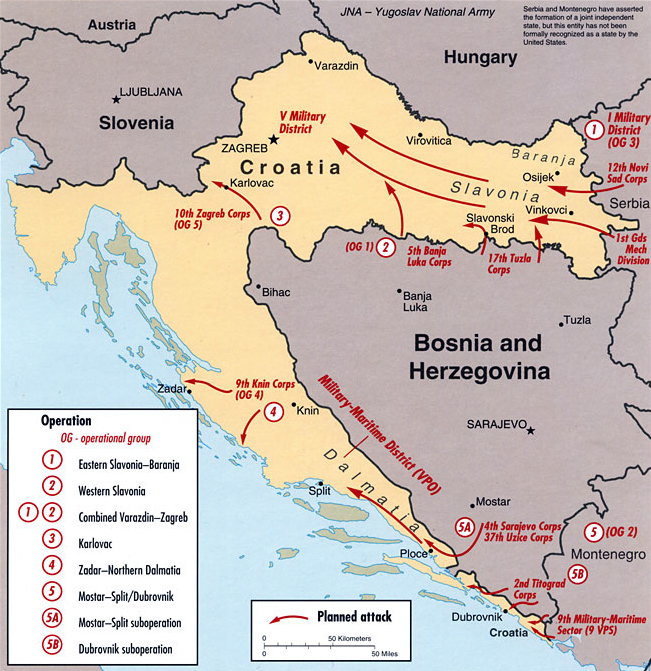|
Serbian Army Of Krajina
The Serbian Army of Krajina (SAK, sh-Latn-Cyrl, Srpska vojska Krajine, Српска војска Крајине, abbr. SVK), also known as the Army of the Republic of Serbian Krajina or Krajina Serbian Army, was the armed forces of the Republic of Serbian Krajina (RSK). The SVK consisted of ground and air elements. Created through the merger of the Territorial Defense of the Republic of Serbian Krajina (TORSK), units of the Yugoslav People's Army (JNA) and the Krajina Militia, the SVK was officially established on 19 March 1992. Responsible for the security of the RSK, its area of responsibility covered an area of some 17,028 km² at its peak, as it was located entirely inland it thus had no naval forces. The SVK, along with the state of RSK, ceased to exist in 1995 following the Croatian military offensive Operation Storm. Organization Commanders-in-Chief Commanders Structure * 105th Aviation Brigade * 44th Air defense rocket brigade * 75th Mixed ... [...More Info...] [...Related Items...] OR: [Wikipedia] [Google] [Baidu] |
Croatian War Of Independence
The Croatian War of Independence) and (rarely) "War in Krajina" ( sr-Cyrl-Latn, Рат у Крајини, Rat u Krajini) are used. was an armed conflict fought in Croatia from 1991 to 1995 between Croats, Croat forces loyal to the Government of Croatia—which had declared Independence of Croatia, independence from the Socialist Federal Republic of Yugoslavia (SFRY)—and the Serbs, Serb-controlled Yugoslav People's Army (JNA) and Serbs of Croatia, local Serb forces, with the JNA ending its combat operations by 1992. A majority of Croats supported Croatia's independence from Yugoslavia, while many ethnic Serbs living in Croatia, supported by Republic of Serbia (1992–2006), Serbia, opposed the secession and advocated Serb-claimed lands to be in a common state with Serbia. Most Serbs sought a new Serb state within a Yugoslav federation, including areas of Croatia and Bosnia and Herzegovina with ethnic Serb majorities or significant minorities, and attempted to conquer as muc ... [...More Info...] [...Related Items...] OR: [Wikipedia] [Google] [Baidu] |
Milan Čeleketić
Milan Čeleketić ( sr-cyr, Милан Челекетић; born 12 August 1946) is a Serbian former major general active in the Serbian Army of Krajina and in the Armed Forces of FR Yugoslavia during and after the Croatian War of Independence. Čeleketić was the commander of the 18th Western Slavonian Corps of the Serbian Army of Krajina. He became Chief of the Main Staff of the Serbian Army of Krajina on 22 February 1994. After the fall of Western Slavonia, he resigned as Chief on 17 May 1995. After Operation Storm, he lived in Banja Luka Banja Luka ( sr-Cyrl, Бања Лука, ) or Banjaluka ( sr-Cyrl, Бањалука, ) is the List of cities in Bosnia and Herzegovina, second largest city in Bosnia and Herzegovina and the largest city in Republika Srpska. Banja Luka is the tr ... for a time. References 1946 births Living people People from Kikinda Military of Serbian Krajina Serbian soldiers Yugoslav soldiers Officers of the Yugoslav People's Ar ... [...More Info...] [...Related Items...] OR: [Wikipedia] [Google] [Baidu] |
Colonel
Colonel ( ; abbreviated as Col., Col, or COL) is a senior military Officer (armed forces), officer rank used in many countries. It is also used in some police forces and paramilitary organizations. In the 17th, 18th, and 19th centuries, a colonel was typically in charge of a regiment in an army. Modern usage varies greatly, and in some cases, the term is used as an Colonel (title), honorific title that may have no direct relationship to military. In some smaller military forces, such as those of Monaco or the Holy See, Vatican, colonel is the highest Military rank, rank. Equivalent naval ranks may be called Captain (naval), captain or ship-of-the-line captain. In the Commonwealth of Nations, Commonwealth's air force ranking system, the equivalent rank is group captain. History and origins By the end of the late medieval period, a group of "companies" was referred to as a "column" of an army. According to Raymond Oliver, , the Spanish began explicitly reorganizing part of thei ... [...More Info...] [...Related Items...] OR: [Wikipedia] [Google] [Baidu] |
18th Western Slavonian Corps
The 18th Western Slavonian Corps was a military unit of the Serbian Army of Krajina commanded by Lazo Babić and Milan Čeleketić, whom was appointed Main Staff of the Serbian Army of Krajina after the previous incumbent Mile Novaković resigned in 1994. Čeleketić left his position after the defeat during Operation Flash. The SAO Western Slavonia Territorial Defense and Okučani Brigade had been destroyed by the Croatian Army in 1991–92, remnants of the brigade merged into the 18th Slavonian Corps, this included form members of the Yugoslav People's Army. The 18th Western Slavonian Corps was composed of seven infantry and artillery battalions. The 18th Western Slavonia Corps area of responsibility was Okučani including all of Western Slavonia. The SVK had 3,500-4,000 defending the area. During Operation Flash, the victory was crucial for the defense of Western Slavonia, the Corps, lacking in the ability to fight and were numerically weaker. On May 3, the Serbian Army ... [...More Info...] [...Related Items...] OR: [Wikipedia] [Google] [Baidu] |
105th Aviation Brigade
The 105th Aviation Brigade () was formed from the disbanded Yugoslav 105th Fighter-Bomber Aviation Regiment in the spring of 1993 by the Serbian Army of Krajina at Udbina Airport. Its accurate organization is unknown, and it's not exactly clear whether the brigade was part of Republika Srpska Air Force due to the aircraft had same roundels. It consisted from at least one combat squadron nicknamed "Kobre" (''Cobras'' - same as former 249th Squadron) and 56th Mixed Helicopter Squadron. The brigade was equipped with 12 Soko J-21 Jastreb, J-21 Jastreb light ground-attack aircraft, at least two G-2 Galeb trainer jets, 4 Aérospatiale Gazelle, Soko Gazelle helicopters and four Aérospatiale Gazelle, Gazelle Gama anti-tank helicopters, two Mil Mi-8, Mil Mi-8T transport helicopters, one Antonov An-2 and number of Utva 66, Utva 75, J-20 Kraguj and Zlin Z-526 aircraft. Aircraft from Udbina airport have taken part in wars in both War in Croatia, Croatia and War in Bosnia, Bosnia because th ... [...More Info...] [...Related Items...] OR: [Wikipedia] [Google] [Baidu] |
Srpska Vojska Krajine, Desetarski Emblem
Srpska, meaning "Serbian" in Serbian, may refer to: * Republika Srpska, one of the two major entities of Bosnia and Herzegovina, a country in southeastern Europe * Serbia, a country in southeastern Europe * Serbian republic (other), the translation of the name of several Serbian administrations, most in northern and southeastern Bosnia * Srpska, Montenegro Srpska () is a village in the new Zeta Municipality of Montenegro. Until 2022, it was part of Podgorica Municipality. History Before Kingdom of Montenegro united with the Kingdom of Serbia and State of Slovenes, Croats and Serbs to form the Kingdo ..., a village near Podgorica, the capital of Montenegro *'' Srpska: The Struggle for Freedom'', a 2022 documentary film {{disambig Serbian words and phrases ... [...More Info...] [...Related Items...] OR: [Wikipedia] [Google] [Baidu] |
Krajina Army Territorial Division
Krajina () is a Slavic toponym, meaning 'country' or 'march'. The term is related to ''kraj'' or ''krai'', originally meanings ''land'', ''country'' or ''edge''Rick Derksen (2008), ''Etymological Dictionary of the Slavic Inherited Lexicon'', Brill: Leiden-Boston, page 244 and today denoting a region or province, usually remote from urban centers. Etymology The Serbo-Croatian word ''krajina'' derives from Proto-Slavic *''krajina'', derived from *''krajь'', related to *''krojiti'' 'to cut';''*krajina'' in Oleg Trubačóv (ed.) (1974–), ''Этимологический словарь славянских языков'' tymological dictionary of Slavic languages Moscow: Nauka, volume 12, pages 87-88 the original meaning of ''krajina'' thus seems to have been 'place at an edge, fringe, borderland', as reflected in the meanings of Church Slavonic , '. In Old East Slavic: Ѹкраина/Ꙋкраина, romanized: Oukraina ˈkrɑjinɑ appears in the Hypatian Codex of c. 1425 under th ... [...More Info...] [...Related Items...] OR: [Wikipedia] [Google] [Baidu] |
Milan Martić
Milan Martić ( sr-Cyrl, Милан Мартић; born 18 December 1954) is a Croatian Serb politician and war criminal who served as the president of the unrecognized Republic of Serbian Krajina, a self-proclaimed state largely populated by Serbs of Croatia that wished to break away from Croatia during the Croatian War of Independence. After the war, Martić was indicted for war crimes by the International Criminal Tribunal for the former Yugoslavia (ICTY) in 2005 was convicted of war crimes on 12 June 2007 and sentenced to 35 years in prison where he was transferred to in 2009. He is serving his sentence in Estonia. Biography Martić was born on 18 November 1954 in the village of Žagrović, in the Knin municipality. He graduated from the Post-Secondary Police School in Zagreb and between 1976 and 1981 worked as a policeman at the Public Security Station (SJB) in Šibenik. From 1982 onwards, Martić was a Junior Police Inspector in Knin and was eventually promoted to Chief o ... [...More Info...] [...Related Items...] OR: [Wikipedia] [Google] [Baidu] |
Goran Hadžić
Goran Hadžić ( sr-cyrl, Горан Хаџић, ; 7 September 1958 – 12 July 2016) was a Croatian Serb politician and President of the self-proclaimed Republic of Serbian Krajina, during the Croatian War of Independence. He was accused of crimes against humanity and of violation of the laws and customs of war by the International Criminal Tribunal for the former Yugoslavia. Hadžić was charged with 14 counts of war crimes and crimes against humanity. The charges included criminal involvement in the "deportation or forcible transfer of tens of thousands of Croat and other non-Serb civilians" from Croatian territory between June 1991 and December 1993, including 20,000 from Vukovar; the forced labour of detainees; the "extermination or murder of hundreds of Croat and other non-Serb civilians" in ten Croatian towns and villages including Vukovar; and the "torture, beatings and killings of detainees", including 264 victims seized from Vukovar Hospital. Serbian authorities ca ... [...More Info...] [...Related Items...] OR: [Wikipedia] [Google] [Baidu] |
Milan Babić
Milan Babić ( sr-Cyrl, Милан Бабић; 25 February 1956 – 5 March 2006) was a Croatian Serb politician and war criminal who served as the first president of the Republic of Serbian Krajina, a self-proclaimed state largely populated by Serbs of Croatia that wished to break away from Croatia during the Croatian War of Independence. After the war, he was indicted for war crimes by the International Criminal Tribunal for the former Yugoslavia (ICTY) in 2004 and was the first ever indictee to plead guilty and enter a plea bargain with the prosecution, after which he was sentenced to 13 years in prison. Babić expressed "shame and remorse" in a public statement and asked his "Croatian brothers to forgive their Serb brothers" for their actions. After he was sentenced in 2004, Babić was found dead in his prison cell in The Hague in March 2006, in an apparent suicide. Early life Milan Babić, the son of Božo Babić, was born in 1956 in the village of Kukar near the town of ... [...More Info...] [...Related Items...] OR: [Wikipedia] [Google] [Baidu] |
Yugoslav People's Army
The Yugoslav People's Army (JNA/; Macedonian language, Macedonian, Montenegrin language, Montenegrin and sr-Cyrl-Latn, Југословенска народна армија, Jugoslovenska narodna armija; Croatian language, Croatian and ; , JLA), also called the Yugoslav National Army, was the military of the Socialist Federal Republic of Yugoslavia and its antecedents from 1945 to 1992. Origins The origins of the JNA started during the Yugoslav Partisans of World War II. As a predecessor of the JNA, the People's Liberation Army of Yugoslavia (NOVJ) was formed as a part of the Resistance during World War II, anti-fascist World War II in Yugoslavia, People's Liberation War of Yugoslavia in the Bosnian town of Rudo on 22 December 1941. After the Yugoslav Partisans liberated the country from the Axis Powers, that date was officially celebrated as the "Day of the Army" in the Socialist Federal Republic of Yugoslavia (SFR Yugoslavia). In March 1945, the NOVJ was renamed the "Yugo ... [...More Info...] [...Related Items...] OR: [Wikipedia] [Google] [Baidu] |



